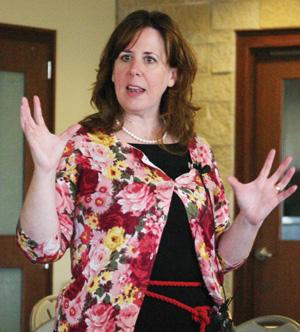
By Celine Klosterman
IOWA CITY — It’s essential for Catholics to foster unity while promoting respect for human life and dignity. Otherwise, our message will have no impact, and we’ll lose credibility, Helene Paharik told about 40 people Oct. 8.
The speaker at the 18th annual Iowa Institute for Social Action, she worked to unite advocates for pro-life issues and supporters of social justice ministries during her daylong workshop, “Respect for Human Life and Dignity of the Human Person: Basis of all Social Concerns.”
Laying the foundation for her presentation, she said the most important aspect of humanity is that people were formed in God’s image. It’s because people are “God’s living icons” that abortion and other social evils are so offensive, said Paharik, director of the Department of Human Dignity and Secretariat for Evangelization and Social Concerns in the Diocese of Pittsburgh.
If we lose our sense of the divine, we lose equally our sense of the human. Without God, man can organize the world only against man, Paharik said, quoting Cardinal Henri de Lubac, a 20th-century French theologian.
We are called to love others as God loves us. “Man can fully discover his true self only in a sincere giving of himself,” she said, citing Pope John Paul II.
Paharik outlined the Compendium of the Social Doctrine of the Church, which offers an overview of Church teachings compiled by the Pontifical Council for Justice and Peace.
When it comes to shaping public policy, the Church’s role is not to say who to vote for or which political party to join, she noted. No party or candidate embraces the fullness of Catholic teaching. The Church’s role is to guide Catholics in forming their consciences in accordance with God’s truth.
To help Catholics do so, the U.S. bishops approved the document “Forming Consciences for Faithful Citizenship” in 2007 and reissued it with a new introduction earlier this month. The statement explains that some “intrinsically evil” actions, such as abortion and euthanasia, are so incompatible with love of God and neighbor that they must always be opposed. Other assaults on life and dignity, such as genocide, torture and racism, can never be justified.
Paharik noted four types of intrinsic evils: those that destroy the most vulnerable, innocent human life (including infanticide and destruction of embryos), those that destroy human life (such as homicide, targeting of civilians in wars and capital punishment), those that threaten human life (hunger, slavery and pornography), and those that diminish human life (lack of housing, health care and education).
“As Catholics, we need to support one another as our community of faith defends human life and dignity wherever it is threatened” and as our community promotes charity, she said. “We are not factions, but one family of faith fulfilling the mission of Jesus Christ.”
The American political scene needs our witness, she added.
Later, Paharik touched on the four R’s of Catholicism: reverence (for God and for humans from conception to natural death), reason (which must be combined with faith), reconciliation (which people must practice with their enemies) and resurrection (which gives Christians reason to hope).
“Your coming together today is a reason for hope,” she said. “Today is a sign of union, a witness.”
Individually, none of us have the whole truth, Paharik added. We must try to learn from others.
The speaker challenged institute participants to spend a little time on an issue that doesn‘t have their heart. “It might not float your boat, but it could float our boat.”
Kent Ferris, director of social action for the Diocese of Davenport, voiced appreciation for her presentation. “After today, I feel more prepared to address the multitude of issues we’re responsible for,” he said.
“What better way to build the kingdom of God than to become a bridge yourself,” said attendee Emigdio Lopez-Sanders, a member of Sacred Heart Parish in Newton. He appreciated Paharik’s final challenge and said he’d consider getting involved in prison ministry or a CROP Hunger Walk as a result.
St. Thomas Aquinas believed you need to understand others’ views as well as your own, said Mary Rourke, an institute participant and member of St. Paul the Apostle Parish in Davenport. She cited Philippians 2:3-4: “…Humbly regard others as more important than yourselves, each looking out not for his own interests, but (also) everyone for those of others.”
Paharik’s message inspired her to try to “disagree agreeably” with friends who have different views. “I think it’s important to read and listen patiently to different perspectives.”








